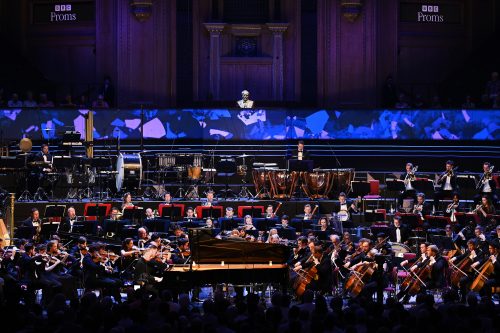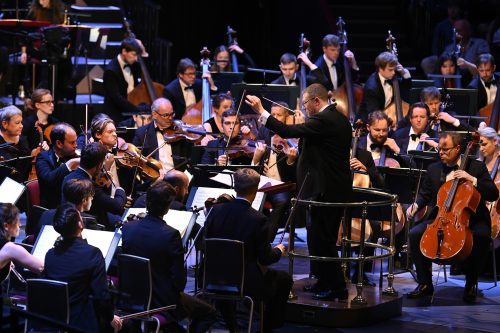
 United Kingdom PROM 21 – Numerous: Steven Osborne (piano), Sinfonia of London / John Wilson (conductor). Royal Albert Corridor, London, 4.8.2024. (CK)
United Kingdom PROM 21 – Numerous: Steven Osborne (piano), Sinfonia of London / John Wilson (conductor). Royal Albert Corridor, London, 4.8.2024. (CK)

Marsalis – Herald, Holler and Hallelujah! (UK premiere)
Copland – Suite, Billy the Child
Barber – Adagio for Strings
Gershwin (orch. Ferde Grofe) – Rhapsody in Blue
Ives – The Unanswered Query
Adams – Harmonielehre
There was a queue for returns for final Sunday’s Promenade with John Wilson and his crack pick-up band, the Sinfonia of London, serving up a crowd-pleasing mixture of American music: and it proved to be a humdinger. All the most important names amongst American composers had been there: there was no try and introduce us to the music of somebody we didn’t know. When these acquainted items are performed in addition to this, although, it might be churlish to complain.
Most likely the least-known music (solely as a result of it’s the latest) was the six-minute opener, Wynton Marsalis’s Herald, Holler and Hallelujah! It’s arduous to understand that the nice jazzman has been a part of our musical panorama for forty years. On this piece he appears much less eager about expressing his personal persona than in paying homage to others: admirably unselfish, although it robs the music of memorability. It alternates between the extensive views of Coplandesque prairie and the busy, brassy Metropolis: there are quiet reminiscences of the Fanfare for the Frequent Man, and Marsalis even finds room for the anvil from Copland’s Third Symphony. Then for the ultimate furlong the orchestra settles into big-band swing: six horns elevate their bells, however – surprisingly – the music winds down like a clock on the finish. An efficient concert-opener, although it leaves nothing behind.
Subsequent, the real Copland article: the Suite from Billy the Child. Much less usually performed, maybe, than Rodeo or Appalachian Spring: however prime Copland nonetheless. The Open Prairie solid a right away and recognisable spell; sprightly woodwind introduced Road in a Frontier City to life – actually sharp, characterful enjoying, with each participant gentle on his toes. Woodblock and guero added color and rhythm to Mexican Dance earlier than Prairie Evening introduced quieter, at occasions virtually hymnic sounds, with unvarnished simplicity from the cellos and a wonderful, prolonged trumpet solo (the London Symphony Orchestra’s James Fountain). Gun Battle reverberated splendidly across the corridor: Billy’s Seize and Demise introduced perky woodwind and shining strings earlier than we had been returned to the calm grandeur and wide-open areas of the Prairie. Twenty minutes, all of a bit, superbly and sympathetically performed.
With Gershwin’s Rhapsody in Blue simply across the nook, Barber’s Adagio for Strings might need appeared an interlude, a chance to chill out earlier than the upcoming pleasure: however it too was superbly performed, Wilson shaping and pointing the strategy to the climactic cry of uncooked agony – left unanswered, hanging within the air – and its aftermath with tact in addition to talent: because the music light away to nothing, it was nigh unattainable to mark the second when the enjoying of the Sinfonia’s strings ceased. The efficiency was fervently acquired.
And so to Rhapsody in Blue: Chris Richards’s clarinet glissando was characterfully taken, although it was his exaggerated wail within the subsequent phrase that introduced viewers laughter. The efficiency made a fizzing finish to the primary half: the orchestra was on it to a person, a lot in order that on the finish Steven Osborne, the brilliantly deft pianist, turned to the orchestra, raised his arms and bowed to them as in the event that they had been superior beings earlier than his jazzy encore of Duke Ellington’s Issues Ain’t What They Used To Be.

I’m most likely in a minority of 1 right here, however Ives’s The Unanswered Query appears to me an instance of a bit valued for its significance, its philosophical freight, quite than for its musical curiosity. It’s partly the fault of Bernstein and his Harvard Lectures. I keep in mind him conducting the piece with the New York Philharmonic on this corridor, in a pair of concert events marking the bicentenary of American Independence: a while earlier than the music’s finish he walked neatly off the stage, like a Deist God who units the universe in movement after which disappears, leaving it to perform by itself. There are different Ives items I might quite hear: however I need to admit it labored properly, with the sound of the strings coming down from one aspect of the highest gallery, the trumpet solo from the opposite, and the flutes onstage.
When John Adams performed his Harmonielehre within the Barbican greater than twenty years in the past, vital response was guarded: one wrote that he wasn’t positive whether or not it was music or manipulation. Now that views have lengthened on the twentieth-century dominance of Modernism – the Boulez doctrine, if you happen to like – we will take heed to it and luxuriate in it with out guilt. And revel in it we did: Wilson and his hundred virtuosi gave a powerful efficiency, all of the internal elements clear, all these myriads of notes that make up the Adams universe, from booming tubas to glistening piccolos, banks of keyboards and tuned percussion, drums, bells, gongs – as sonic and visible spectacle it yielded little to final Tuesday’s efficiency of Messiaen’s Turangalila Symphony (overview right here). It’s a barnstormer, but additionally a bit of nice magnificence.
There have been performances the place I’ve been tempted to zone out in the course of the primary motion, however that wasn’t doable right here. Nor did I discover myself reflecting on the springs of Adams’s inspiration – goals of supertankers and medieval mystics, Parsifal, Schoenberg, Sibelius, Mahler and the remainder: I used to be an excessive amount of within the music, within the second. And as if this marathon programme hadn’t been sufficient, we had been handled to an encore: Leroy Anderson’s Fiddle Faddle. Pure showbiz: but additionally a rare demonstration of orchestral self-discipline and rhythmic precision. Fairly an evening.
Chris Kettle


